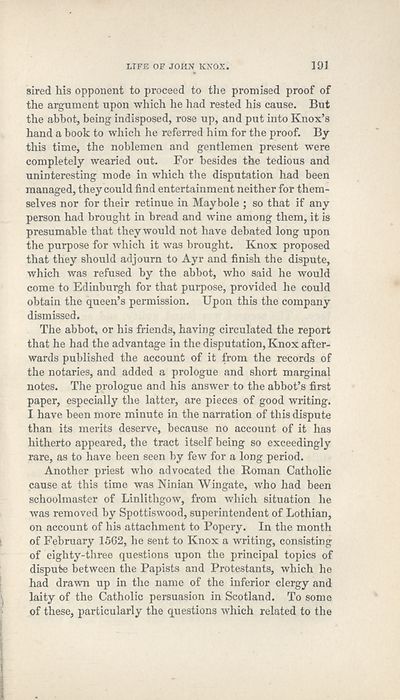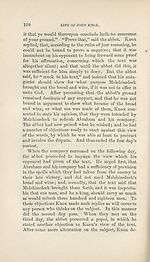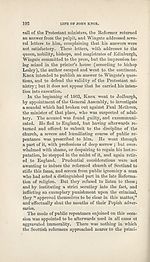Download files
Complete book:
Individual page:
Thumbnail gallery: Grid view | List view

LIFE OF JOHN KNOX.
191
sired his opponent to proceed to the promised proof of
the argument upon which he had rested his cause. But
the abbot, being indisposed, rose up, and put into Knox’s
hand a hook to which he referred him for the proof. By
this time, the noblemen and gentlemen present were
completely wearied out. For besides the tedious and
uninteresting mode in which the disputation had been
managed, they could find entertainment neither for them¬
selves nor for their retinue in Maybole ; so that if any
person had brought in bread and wine among them, it is
presumable that they would not have debat ed long upon
the purpose for which it was brought. Knox proposed
that they should adjourn to Ayr and finish the dispute,
which was refused by the abbot, who said he would
come to Edinburgh for that purpose, provided he could
obtain the queen’s permission. Upon this the company
dismissed.
The abbot, or his friends, having circulated the report
that he had the advantage in the disputation, Knox after¬
wards published the account of it from the records of
the notaries, and added a prologue and short marginal
notes. The prologue and his answer to the abbot’s first
paper, especially the latter, are pieces of good writing.
I have been more minute in the narration of this dispute
than its merits deserve, because no account of it has
hitherto appeared, the tract itself being so exceedingly
rare, as to have been seen by few for a long period.
Another priest who advocated the Roman Catholic
cause at this time was Ninian Wingate, who had been
schoolmaster of Linlithgow, from which situation he
was removed by Spottiswood, superintendent of Lothian,
on account of his attachment to Popery. In the month
of February 1562, he sent to Knox a writing, consisting
of eighty-three questions upon the principal topics of
dispute between the Papists and Protestants, which he
had drawn up in the name of the inferior clergy and
laity of the Catholic persuasion in Scotland. To some
of these, particularly the questions which related to the
191
sired his opponent to proceed to the promised proof of
the argument upon which he had rested his cause. But
the abbot, being indisposed, rose up, and put into Knox’s
hand a hook to which he referred him for the proof. By
this time, the noblemen and gentlemen present were
completely wearied out. For besides the tedious and
uninteresting mode in which the disputation had been
managed, they could find entertainment neither for them¬
selves nor for their retinue in Maybole ; so that if any
person had brought in bread and wine among them, it is
presumable that they would not have debat ed long upon
the purpose for which it was brought. Knox proposed
that they should adjourn to Ayr and finish the dispute,
which was refused by the abbot, who said he would
come to Edinburgh for that purpose, provided he could
obtain the queen’s permission. Upon this the company
dismissed.
The abbot, or his friends, having circulated the report
that he had the advantage in the disputation, Knox after¬
wards published the account of it from the records of
the notaries, and added a prologue and short marginal
notes. The prologue and his answer to the abbot’s first
paper, especially the latter, are pieces of good writing.
I have been more minute in the narration of this dispute
than its merits deserve, because no account of it has
hitherto appeared, the tract itself being so exceedingly
rare, as to have been seen by few for a long period.
Another priest who advocated the Roman Catholic
cause at this time was Ninian Wingate, who had been
schoolmaster of Linlithgow, from which situation he
was removed by Spottiswood, superintendent of Lothian,
on account of his attachment to Popery. In the month
of February 1562, he sent to Knox a writing, consisting
of eighty-three questions upon the principal topics of
dispute between the Papists and Protestants, which he
had drawn up in the name of the inferior clergy and
laity of the Catholic persuasion in Scotland. To some
of these, particularly the questions which related to the
Set display mode to:
![]() Universal Viewer |
Universal Viewer | ![]() Mirador |
Large image | Transcription
Mirador |
Large image | Transcription
| Antiquarian books of Scotland > Scotland/Scots > Life of John Knox ; and, The life of Alexander Henderson > (209) |
|---|
| Permanent URL | https://digital.nls.uk/131834812 |
|---|
| Description | Thousands of printed books from the Antiquarian Books of Scotland collection which dates from 1641 to the 1980s. The collection consists of 14,800 books which were published in Scotland or have a Scottish connection, e.g. through the author, printer or owner. Subjects covered include sport, education, diseases, adventure, occupations, Jacobites, politics and religion. Among the 29 languages represented are English, Gaelic, Italian, French, Russian and Swedish. |
|---|

